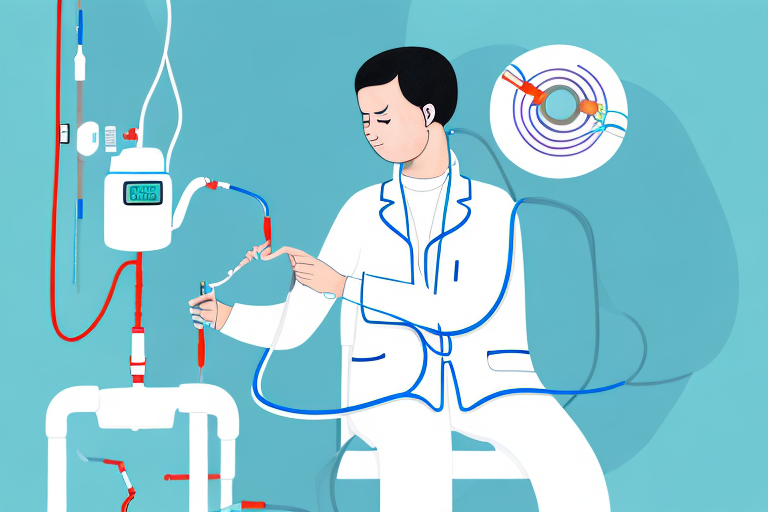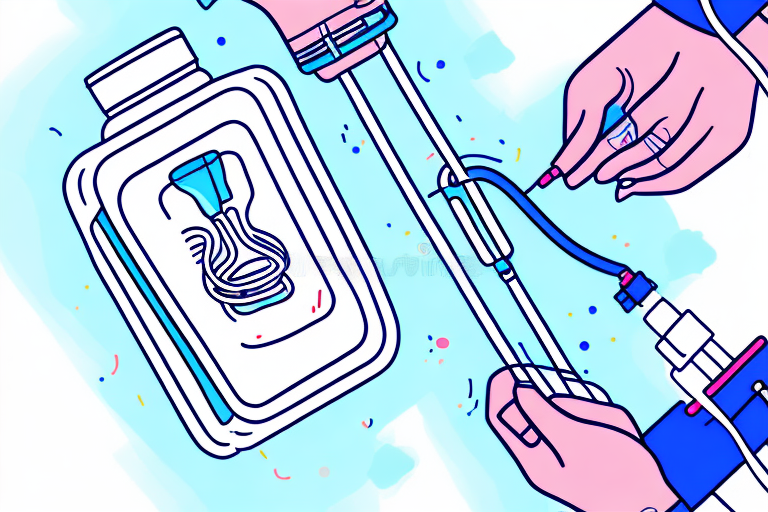What Is IV Infusion Therapy and How Can It Benefit You?
Have you ever felt fatigued or lethargic, even after a good night's sleep? Or perhaps you've struggled to recover from a tough workout or an illness? IV infusion therapy may offer a solution to these issues. In this article, we'll explore the benefits, risks, and potential side effects of IV infusion therapy.

Understanding IV Infusion Therapy
What is IV Infusion Therapy?
IV infusion therapy is a medical treatment that involves administering fluids, nutrients, and medications directly into the bloodstream through an IV catheter. This method of delivery bypasses the digestive system, allowing for rapid absorption and utilization of these substances by the body.
IV infusion therapy is commonly used to treat a variety of conditions, including dehydration, nutrient deficiencies, and chronic illnesses. It is also used to improve athletic performance, boost energy levels, and enhance overall wellness.
Types of IV Infusion Therapies
There are various types of IV infusion therapies available, each with its own unique benefits and applications. Some of the most common types include:
- Hydration therapy: This type of IV infusion therapy involves administering fluids to help rehydrate the body. It is commonly used to treat dehydration caused by illness, exercise, or other factors.
- Vitamin C therapy: Vitamin C is a powerful antioxidant that can help boost immune function, reduce inflammation, and promote overall health. IV infusion therapy allows for high doses of vitamin C to be delivered directly into the bloodstream, bypassing the digestive system.
- B-complex therapy: B vitamins are essential for energy production, brain function, and overall health. IV infusion therapy can help ensure that the body is getting the necessary amounts of these important nutrients.
- Amino acid therapy: Amino acids are the building blocks of protein and are essential for muscle growth, repair, and overall health. IV infusion therapy can help ensure that the body is getting the necessary amounts of these important nutrients.
- Glutathione therapy: Glutathione is a powerful antioxidant that can help protect the body from damage caused by free radicals. IV infusion therapy allows for high doses of glutathione to be delivered directly into the bloodstream, bypassing the digestive system.
How does IV Infusion Therapy work?
During IV infusion therapy, fluids, nutrients, and medications are delivered directly into the bloodstream through an IV catheter. This allows for rapid absorption and utilization of these substances by the body, bypassing the digestive system, which can slow down the absorption and utilization of these substances.
The IV catheter is typically inserted into a vein in the arm, although other sites may be used depending on the individual's needs. The fluids, nutrients, and medications are delivered at a controlled rate, ensuring that the body is able to absorb and utilize them efficiently.
IV infusion therapy is generally a safe and effective treatment option for a wide range of conditions. However, as with any medical treatment, there are some risks and potential side effects that should be considered. These may include infection, bleeding, and allergic reactions, among others.
It is important to discuss the potential risks and benefits of IV infusion therapy with a qualified healthcare provider before undergoing treatment. They can help determine if this treatment is right for you and develop a treatment plan that meets your individual needs and goals.

Benefits of IV Infusion Therapy
Rapid Hydration and Nutrient Absorption
IV infusion therapy can rehydrate the body quickly and effectively, delivering fluids and electrolytes directly into the bloodstream. IV therapy can also improve the absorption and utilization of essential vitamins and minerals, such as vitamin C, vitamin B12, and magnesium, which can help support overall health and wellness.
Boosting Immune System Function
IV infusion therapy can also help boost the immune system by delivering vital nutrients and antioxidants that support immune function. Vitamin C and other key nutrients can help improve white blood cell function and reduce inflammation, which are critical components of immune health.
Increased Energy Levels
IV infusion therapy can also help improve energy levels by delivering important nutrients and electrolytes that support energy production. This can help combat fatigue and boost overall energy levels, allowing for improved productivity and performance.
Improved Athletic Performance and Recovery
Athletes can benefit from IV infusion therapy as it can improve athletic performance and aid in recovery. This is because IV therapy can help rehydrate the body, improve nutrient absorption and reduce inflammation, all of which are crucial for optimal athletic performance and recovery.

Managing Chronic Conditions
IV infusion therapy can also be used to manage chronic conditions such as migraines, fibromyalgia, Crohn's disease, and chronic fatigue syndrome. IV therapy can help alleviate symptoms and improve overall quality of life for individuals suffering from these conditions.
Potential Risks and Side Effects
IV infusion therapy is a medical treatment that involves the administration of fluids and medications directly into a patient's bloodstream through an IV catheter. While it can be a highly effective way to deliver treatment, there are potential risks and side effects that patients should be aware of.
Infection and Inflammation
One of the most common risks associated with IV infusion therapy is infection and inflammation. This can occur if the IV catheter site becomes infected or if the fluids being administered are contaminated. Patients who undergo IV infusion therapy should be monitored closely for signs of infection, such as redness, swelling, or tenderness at the catheter site. If an infection is suspected, the catheter may need to be removed and the patient may require antibiotics to clear the infection.
Inflammation can also occur if the fluids being administered are too acidic or too alkaline. This can cause pain, swelling, and redness at the catheter site, and may require the infusion to be stopped or the catheter to be repositioned.
Allergic Reactions
Another potential risk of IV infusion therapy is an allergic reaction to the fluids or medications being administered. This can result in symptoms such as hives, itching, and difficulty breathing. Patients who have a history of allergies should inform their healthcare provider before undergoing IV infusion therapy. In some cases, premedication with antihistamines or steroids may be necessary to prevent an allergic reaction.
Overhydration and Electrolyte Imbalance
IV infusion therapy can also lead to overhydration and electrolyte imbalances if too much fluid is administered. This can cause symptoms such as headaches, nausea, and muscle weakness. Patients who undergo IV infusion therapy should be monitored closely for signs of fluid overload or electrolyte imbalances, such as swelling, shortness of breath, or irregular heartbeats. If these symptoms occur, the infusion may need to be stopped or the patient may require additional treatment to correct the imbalances.
Air Embolism
Although rare, air embolism is a potentially serious complication that can occur during IV infusion therapy. This happens when air enters the IV catheter and travels to the lungs or brain, causing symptoms such as chest pain, shortness of breath, and confusion. To prevent air embolism, healthcare providers should ensure that all air is removed from the IV tubing before administering fluids, and that the catheter is properly secured to prevent dislodgement.
In conclusion, IV infusion therapy can be a highly effective way to deliver fluids and medications to patients. However, it is important for patients to be aware of the potential risks and side effects associated with this treatment, and to communicate any concerns or symptoms to their healthcare provider. With proper monitoring and care, the benefits of IV infusion therapy can outweigh the risks.
Conclusion
Overall, IV infusion therapy can benefit a wide range of individuals, including those seeking hydration, nutrient supplementation, immune support, improved athletic performance, and managing chronic conditions. However, it's essential to be aware of the potential risks and side effects associated with IV infusion therapy. Discussing these risks with a knowledgeable healthcare provider can help you make an informed decision about whether IV infusion therapy is right for you.











